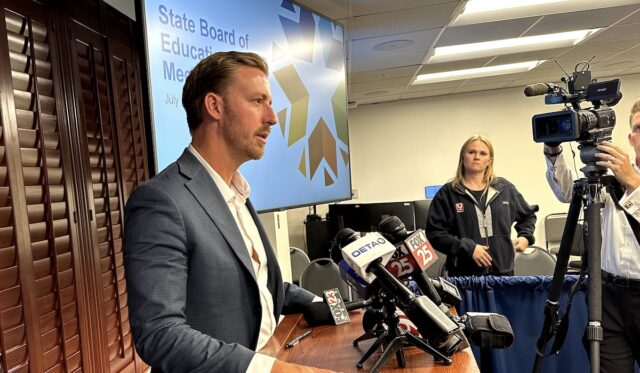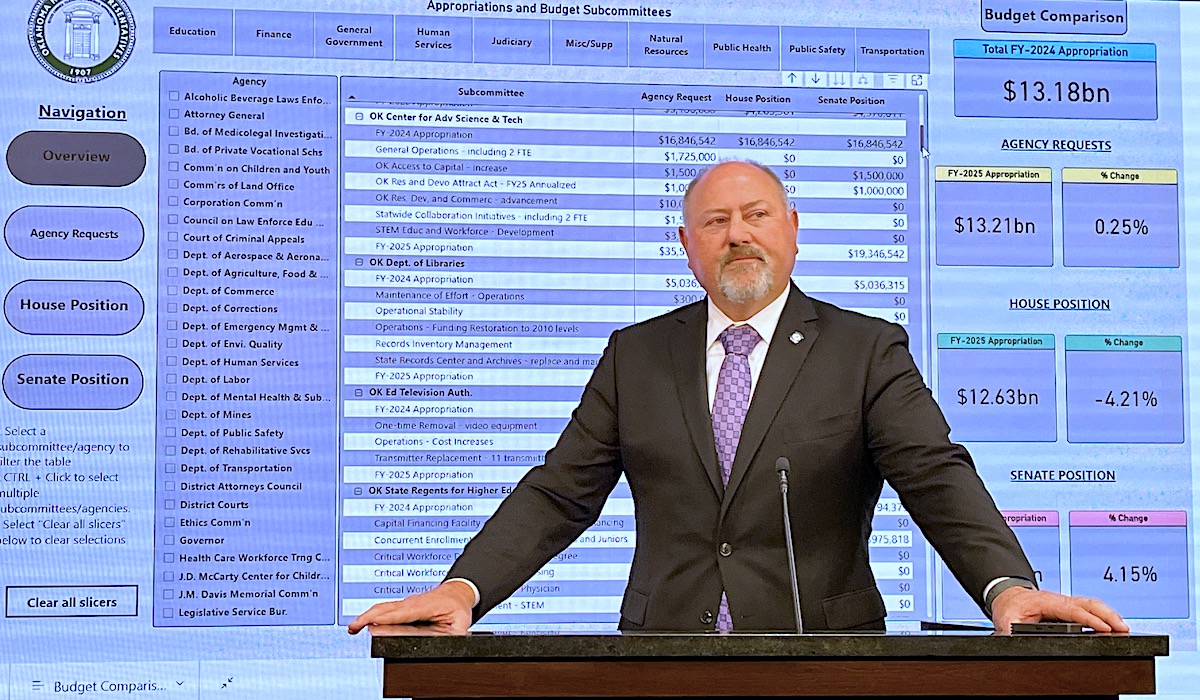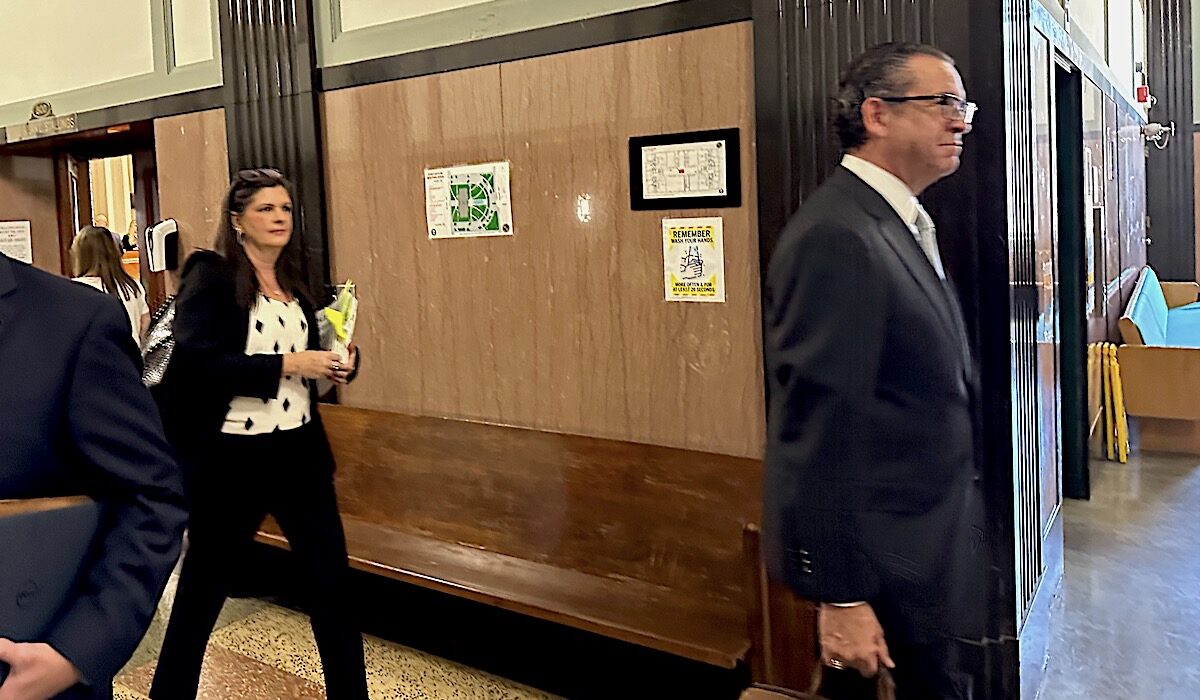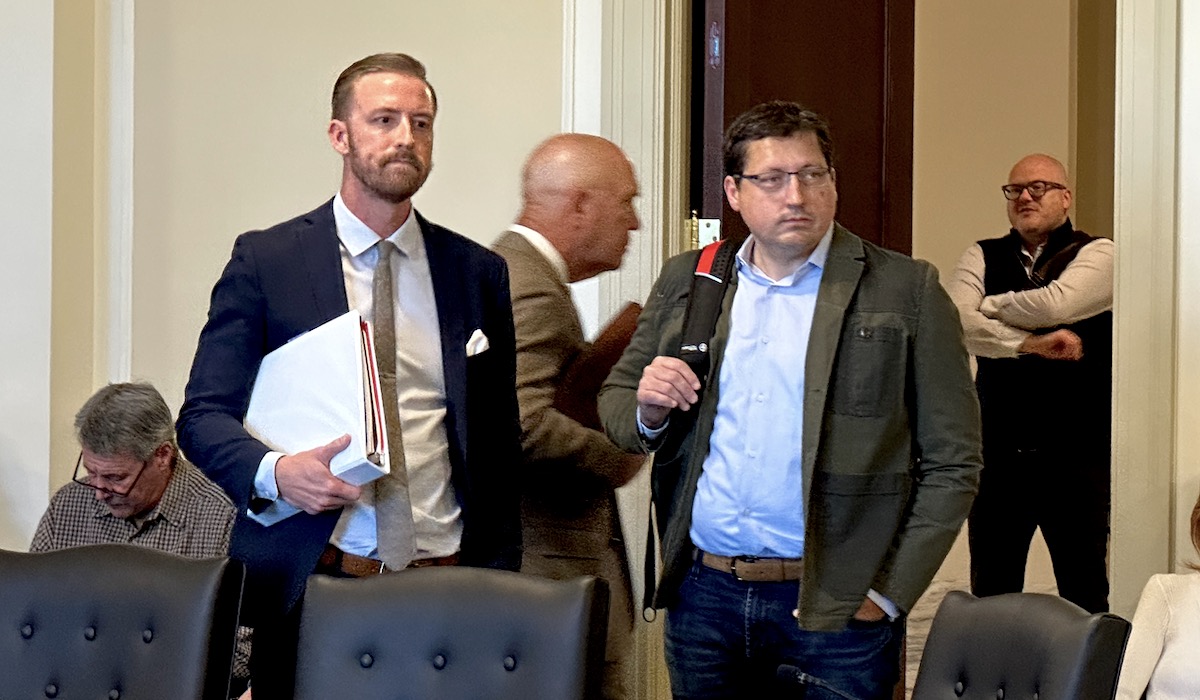

(Update: On Sunday, Aug. 18, Oklahoma Attorney General Gentner Drummond released an “expedited opinion” directing the State Department of Education to allow school districts to rollover money in the school security revolving fund for subsequent years. In a press release accompanying the opinion (linked here), Drummond criticized State Superintendent of Public Instruction Ryan Walters for waiting until news reports surfaced of OSDE refusing to disburse rollover funds to request the opinion.
“Those wasted months have resulted in school districts not receiving millions of dollars in funds they could have used to bolster security and protect students,” Drummond reportedly wrote in a letter to Walters. “I pray that your failure to deploy these funds does not result in deadly consequences.”
This article remains in its original form.)
If you thought Oklahoma education news might slow down as folks focus on taking back-to-school photos in the drop-off line, think again.
This afternoon, House Appropriations and Budget Committee Chairman Kevin Wallace announced that the Legislative Office of Fiscal Transparency he also chairs will begin investigating “spending concerns” regarding the Oklahoma State Department of Education, which is led by embattled Superintendent of Public Instruction Ryan Walters.
“In my capacity as chairman, I intend to have LOFT investigate funding disbursement concerns raised by both citizens and legislators in regard to funds earmarked to OSDE for specific purposes,” said Wallace (R-Wellston).
Speaking of Ryan Walters, he has spent the week on his heels as questions mount on a variety of topics. Outlined by day below, those issues have spanned the gambit.
- Monday —
- NonDoc reporting revealed that Attorney General Gentner Drummond is concerned about how Walters handles — or doesn’t — open records requests.
- M. Scott Carter of The Oklahoman published a story showing that Walters and his agency appear to be withholding state funds meant for schools to purchase inhalers, which added onto other funding concerns which arose last week as a result of a KFOR report.
- Three House Republicans distributed a press release criticizing Walters for his recent remarks about the Superintendent of Bixby Public Schools.
- That evening, rumors began swirling that House Republicans were circulating a petition asking Speaker Charles McCall (R-Atoka) to create a committee to investigate Walters.
- Tuesday —
- The House Republicans’ petition became public, revealing the names of about two dozen members who support investigating Walters.
- McCall denied the petition’s requested special investigative committee Tuesday afternoon, saying he won’t consider it until at least 51 members of his caucus are in favor.
- Although he did not sign the petition, McCall’s heir apparent, Kyle Hilbert (R-Bristow), shared some sharp words about Walters.
- Wednesday —
- Fox 25’s Payton May revealed a letter sent last week by Secretary of Education Nellie Tayloe Sanders questioning Walters on his “lack of response” to legislative questions about money appropriated for school security.
If that wasn’t enough to start your week, today has brought even more developments. Learn about those items and other education news nuggets below that might have flown under your back-to-school radar.
Wallace: LOFT will investigate OSDE spending concerns

As the House’s budget chairman for the past seven regular sessions, Rep. Kevin Wallace has overseen historic investments into Oklahoma’s public education system. He has also chaired the Legislative Office of Fiscal Transparency, which was formed in 2019 to provided lawmakers with stronger oversight opportunities for the dollars they dish out to agencies.
On Thursday, Wallace announced that concerns about how money is or is not flowing through OSDE for specific programs necessitate a formal LOFT inquiry.
“This isn’t about Superintendent Walters,” Wallace said. “This is about the transparency of a state agency and getting answers for our constituents. When the Legislature approves funding for a specific purpose, it is incumbent on the agency to which those funds are allocated to spend them properly and in a timely manner. If there are issues with disbursements being made, that information should be communicated to the Legislature well before schools are encumbered.”
In the press release announcing the LOFT investigation, McCall noted that his office would also be reporting information about Open Records Act and Open Meeting Act issues to the attorney general.
“LOFT is designed to ensure that taxpayer dollars are being spent responsibly by state agencies, making them the ideal entity to examine any concerns related to spending at OSDE,” McCall said. “This investigation by LOFT allows us to address these concerns efficiently without the need for a costly special legislative session. I trust that Chairman Wallace, and LOFT, will conduct a comprehensive review that will provide clarity on the issues at OSDE and offer solutions to ensure that taxpayer funds are managed appropriately. I fully support this process. Additionally, my office will be sharing all relevant information with Attorney General Gentner Drummond regarding any potential violations of the Open Records or Open Meeting Acts by OSDE. We are committed to transparency, and the findings from this investigation will be made available to the public.”
While LOFT has bicameral membership and leadership, it’s unclear to what extent the State Senate may participate in the OSDE spending investigation.
“We were made aware that he was going to call for the inquiry,” Senate Appropriations and Budget Chairman Chuck Hall (R-Perry) told NonDoc. “This came directly from Wallace that he is making the inquiry. We’re looking at it right now.”
Bixby superintendent files defamation suit against Walters

On Thursday, Bixby Public Schools Superintendent Rob Miller filed a defamation lawsuit against Walters in Tulsa County District Court.
The lawsuit stems from statements Walters made after a July 31 State Board of Education meeting in response to Miller’s comments on an alleged delay in passing federal funding to local school districts.
“In response to Superintendent Miller’s legitimate inquiry, defendant Walters maliciously attacked, slandered and defamed Superintendent Miller in his individual capacity and occupation as the superintendent of Bixby Public Schools by calling him a ‘liar,’ an ’embarrassment,’ a ‘clown’ and an untrustworthy steward of his school district’s taxpayer funding,” Miller’s attorney said in the petition.
Miller had posted days before on Twitter about the delay, prompting a reporter to ask Walters about it after the meeting. Miller has been a vocal critic of Walters on the social media site.
Walters’ comments about Miller, a veteran of the U.S. Marine Corps, have earned him rebukes from members of his own party in the Legislature. Three Republican members of the House Veterans Caucus said Walters’ statements about Miller underscore his “problematic leadership practices” in a press release Monday.
In a statement Thursday about the latest in nearly a dozen lawsuits against the state superintendent, OSDE director of communications Dan Isett said Miller is actually trying to defame Walters.
“No one is surprised that Miller would abuse the legal system by filing a frivolous lawsuit after trying for days to defame Superintendent Walters in the media,” Isett said. “This lawsuit is a political stunt by a man with a vendetta, not a legal case.”
Walters asks AG for opinions on four topics

Since the July 31 State Board of Education meeting, Walters appears to have submitted four requests for attorney general opinions regarding various issues.
According to email correspondence provided to NonDoc, Walters had a phone conversation with House Speaker-designate Kyle Hilbert on Monday regarding legislative education funding questions.
Walters has faced increased scrutiny over his apparent denial to disburse appropriated funds meant for school security and emergency inhalers in schools. In an email he sent to Hilbert on Tuesday, Walters said he was requesting attorney general opinions on whether unspent funds meant for a three-year school security pilot program can roll over to the next year and whether he can disburse funds meant for emergency inhalers in schools to a nonprofit charged with organizing the program.
“Thank you for the information. I appreciate your phone call last night as well as this afternoon to discuss these issues,” Hilbert said in his reply to Walters. “I have forwarded your email to the attorney general and requested that his office provide legal guidance and clarity. This guidance is needed not only for the Legislature and SDE, but more importantly for students, parents and educators in Oklahoma. Particularly as schools around the state have started or are soon starting the academic year.”
Walters also attached a request for a third attorney general opinion to his email to Hilbert. That request deals with an apparent discrepancy in the law regarding graduation standards for high school seniors.
The three AG opinion requests Walters sent to Hilbert could bring his total number of opinion requests of the last few weeks up to four. Walters told reporters after a July 31 State Board of Education meeting that he plans to request an AG opinion on whether and how legislators can exercise their statutory authority to view State Board of Education executive sessions. Drummond’s office has already said in an unofficial letter that the law requires the board to allow lawmakers to observe the closed-door portion of the meetings.
Phil Bacharach, Drummond’s director of communications, said late Thursday that Walters had not submitted the executive session opinion request to the office, although he has submitted the three others.
Judge Susan Stallings declines to recuse from Epic case

Early Thursday, Oklahoma County District Court Judge Susan Stallings denied a motion that she recuse herself from the embezzlement and racketeering case against the co-founders and former chief financial officer of Epic Charter Schools.
Defense attorney Joe White had filed the motion on behalf of his client, Ben Harris. White’s argument was largely based on the fact that Stallings had worked in former Oklahoma County District Attorney David Prater’s office before she became a judge. Prater’s office initially handled much of the Epic investigation and eventually filed the initial charges against Harris, David Chaney and Josh Brock after reclaiming the case years later.
“There was never a disclosure by your honor that you worked in David Prater’s office while the Epic investigation was underway,” White said during the hearing.
In his written recusal motion, White also said he felt uncomfortable in Stallings’ courtroom and wondered if she was working with the prosecution, which was taken over by Attorney General Gentner Drummond’s office after Prater’s retirement.
“It is the appearance that the prosecutor and the judge are working together, and the defendants are on the outside looking in,” White wrote. “Judge Stallings has chosen a side, and that is the side of the prosecution. There is clear bias in her interactions with prosecutors compared to defense counsel.”
But Stallings said Thursday she never handled the Epic investigation while in Prater’s office, where she was a team lead working primarily on domestic violence cases.
“It has been six years since I’ve been in the district attorney’s office. It is too remote,” Stallings said. “The court finds that there were a lot of assumptions made, but no facts. The court finds that Mr. Harris has failed to meet his burden, and his motion is denied.”
The motion asking Stallings to recuse was the latest in a long series of delays in the case. Although defendants Harris, Chaney and Brock were charged with more than 15 counts related to what has been called the largest embezzlement scheme in state history in June 2022, none of the defendants has entered a plea in the case yet.
The case seemed to finally gain some momentum in March, when all of the parties met for a weeklong preliminary hearing. On Friday of that week, the prosecution called Brock to the stand so he could testify against his former partners. But Assistant Attorney General Jimmy Harmon had not finished questioning Brock by the end of the day, and Special District Judge Jason Glidewell eventually set the matter to resume six weeks later in May.
On the morning the hearing was supposed to continue, it was delayed when Brock’s attorney filed a motion to recuse Chaney’s attorney, Gary Wood, owing to an allegation that Wood had previously acted as Brock’s attorney. If that were true, Wood cross-examining Brock would be a conflict of interest. A hearing on the matter was eventually set for July.
“I never represented Brock,” Wood said at the time.
But that hearing was delayed indefinitely after Harris’ attorney, Joe White, filed the motion to recuse Stallings, who had become the presiding judge, the week of the Wood recusal hearing.
White said after the latest hearing Thursday that he intends to seek a rehearing of his recusal motion before the court’s chief judge. If that goes against him, he also said he would consider an interlocutory appeal to the Oklahoma Court of Criminal Appeals.
Federal judge allows cases against Walters, Langston to continue

On Monday, U.S. District Court Judge for the Western District of Oklahoma Charles Goodwin issued two nearly identical rulings on two separate but nearly identical lawsuits against Walters that have been pending in his courtroom for more than a year.
The lawsuits had been filed against Walters as well as his political controversial advisor and OSDE contract employee, Matt Langston, in both their personal and official capacities. The cases were filed by two former State Department of Education employees who were fired after they allegedly leaked internal documents. Matthew Colwell allegedly gave documents to the Attorney General’s Office and a state representative, and Cheryl McGee allegedly gave documents to the media.
Colwell and McGee allege that Walters and Langston violated their First Amendment rights when the pair fired them. They both filed separate lawsuits alleging similar facts and asking for similar relief May 30, 2023. Motions to dismiss from Walters and Langston had been pending before Goodwin since Aug. 4, 2023.
More than a year later, Goodwin denied Walters’ and Langston’s motion to dismiss the case against them in their personal capacities, but the judge granted their motion to dismiss the case against them in their official capacities. The decision means Walters and Langston could be personally liable for violating Colwell’s and McGee’s First Amendment rights to free speech if the two plaintiffs ultimately prevail.




















